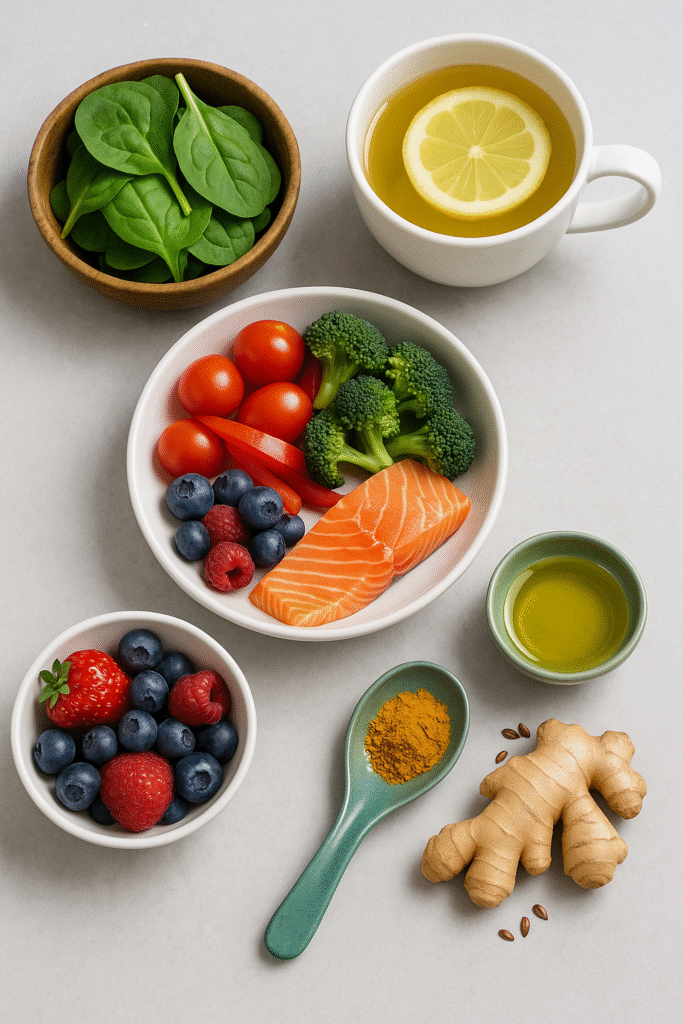using food as medicine
Not medicine as food
A Complete Guide
Why Inflammation Matters
- Acute inflammation = short-term,
- helps heal injuries (like swelling after a cut).
- Chronic inflammation = long-term,
- often silent, and linked to arthritis, back pain, heart disease, diabetes, nerve issues, and slowed injury recovery.
- Diet is one of the biggest factors that
- can either fuel or calm chronic inflammation.
Food contains compounds that act like
natural medicines:
antioxidants, polyphenols, omega-3 fatty acids,
flavonoids, vitamins, and minerals.
Food Groups & Anti-Inflammatory Heroes
1. Vegetables
- Leafy greens (spinach, kale, silverbeet, rocket, broccoli)
- Rich in vitamin K, carotenoids, flavonoids.
- Help reduce inflammatory markers like CRP (C-reactive protein).
- Best use: Daily servings — 2–3 cups cooked or raw.
- Cruciferous (broccoli, Brussels sprouts, cauliflower, cabbage)
- Contain sulforaphane, a compound that reduces oxidative stress.
- Helps protect cartilage and joints.
- Best use: Steamed, stir-fried, or lightly roasted 3–4 times/week.
- Capsicum, sweet potato, carrots, pumpkin, beetroot
- Packed with beta-carotene & anthocyanins.
- Anti-inflammatory antioxidants for skin, nerves, and gut lining.
- Best use: Daily rotation of colorful vegetables (“eat the rainbow”).
2. Fruits
- Berries (blueberries, strawberries, raspberries, blackberries)
- Very high in anthocyanins →
- lower oxidative stress.
- Linked to reduced arthritis symptoms &
- faster muscle recovery.
- Best use: 1 cup fresh/frozen daily.
- Cherries (especially tart Montmorency cherries)
- Reduce uric acid and joint inflammation.
- Commonly used by athletes for recovery.
- Citrus fruits (oranges, lemons, grapefruit)
- Vitamin C =
- collagen protection, tissue repair, immune support.
- Apples, pears, grapes
- Contain quercetin →
- powerful anti-inflammatory flavonoid.
3. Proteins & Meats
- Fatty fish
- (salmon, sardines, mackerel, trout, herring, anchovies)
- High in omega-3 fatty acids (EPA & DHA).
- Reduce joint pain, nerve inflammation,
- protect heart & brain.
- Best use: 2–3 servings per week (100–150 g each).
- Lean poultry (chicken, turkey)
- Less inflammatory than red/processed meats.
- Best consumed in moderation (2–3 times/week).
- Grass-fed beef or lamb (in moderation)
- More omega-3s than grain-fed,
- but still higher in saturated fats.
- Plant proteins (lentils, chickpeas, beans, tofu, tempeh)
- Contain fiber
- + antioxidants + low inflammation profile.
- Best use: several times/week, especially if reducing red meat.
4. Healthy Fats
- Extra virgin olive oil
- Contains oleocanthal, acts like natural ibuprofen.
- Mediterranean diet cornerstone.
- Avocados
- Healthy fats + lutein (eye and joint health).
- Nuts (walnuts, almonds, hazelnuts, pistachios)
- Rich in omega-3 (especially walnuts) and polyphenols.
- Best use: a small handful (30g) daily.
- Seeds (chia, flax, hemp, pumpkin, sunflower)
- Omega-3 + magnesium (anti-inflammatory mineral).
- Great in smoothies, porridge, or salads.
5. Whole Grains
- Oats, quinoa, brown rice, barley, buckwheat
- High fiber = reduce gut inflammation.
- Avoid refined carbs (white bread, pastries) →
- they fuel inflammation.
6. Herbs & Spices
- Turmeric (curcumin)
- One of the strongest natural anti-inflammatories.
- Works best with black pepper (piperine) + healthy fat.
- Ginger
- Reduces pain & swelling, improves digestion.
- Garlic & onions
- Contain sulfur compounds
- that block inflammatory pathways.
- Cinnamon, rosemary, oregano, thyme
- Packed with polyphenols →
- protect against cellular damage.
7. Drinks
- Green tea / Matcha
- High in EGCG,
- powerful anti-inflammatory and antioxidant.
- Herbal teas (ginger, turmeric, chamomile)
- Gentle, daily way to lower inflammation.
- Coffee (in moderation, 1–2 cups/day)
- Contains antioxidants, protective for liver & nerves.
- Avoid: sugary sodas, excessive alcohol →
- strong pro-inflammatory triggers.
Best & Most Common Anti-Inflammatory Foods
- Most studied / proven:
- Salmon & sardines (omega-3)
- Berries & cherries (polyphenols)
- Leafy greens & cruciferous veg
- (sulforaphane, vitamin K)
- Turmeric + ginger (curcumin & gingerols)
- Olive oil (oleocanthal)
- Most common daily choices people use:
- Berries in breakfast smoothies
- Olive oil as salad dressing
- Turmeric in curries or golden milk
- Green tea daily
- Fish 2–3x/week
Why Use Food as Medicine?
- Root cause healing:
- Medicine often masks symptoms,
- but food changes the underlying inflammation pathways.
- Whole-body balance:
- Foods work in synergy —
- vitamins, minerals, antioxidants together.
- Long-term safety:
- No side effects like painkillers or steroids.
- Everyday prevention:
- Prevents heart disease, arthritis flare-ups,
- diabetes, nerve damage.
- Supports natural repair:
- Food literally builds your cells, joints, tissues —
- medicine can’t replace that.
Summary
Switching to anti-inflammatory foods
heals from the inside out:
- Calms chronic inflammation
- Speeds injury & nerve healing
- Protects brain, heart, gut, and joints
- Acts like daily “medicine” without a prescription
Daily formula:
Eat leafy greens + colorful veg + 1 cup berries +
1 serving fatty fish (or omega-3 seeds) + 2 tbsp olive oil
+ turmeric/ginger + herbal tea.
This combo is as powerful as many medical anti-inflammatories — but naturally supports your healing journey.ion Matters


